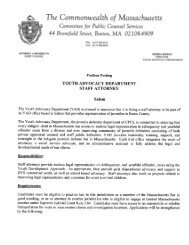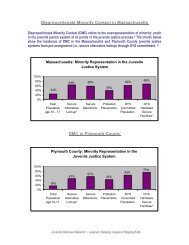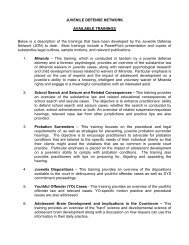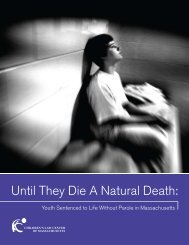States rethink 'adult time for adult crime' - the Youth Advocacy Division
States rethink 'adult time for adult crime' - the Youth Advocacy Division
States rethink 'adult time for adult crime' - the Youth Advocacy Division
You also want an ePaper? Increase the reach of your titles
YUMPU automatically turns print PDFs into web optimized ePapers that Google loves.
"When you teach someone to swim, you don't just throw <strong>the</strong>m in <strong>the</strong> deep end and hope <strong>the</strong>y do<br />
great," said Abby Anderson, executive director of <strong>the</strong> Connecticut Juvenile Justice Alliance, <strong>the</strong><br />
nonprofit agency that spearheaded <strong>the</strong> campaign to change <strong>the</strong> law.<br />
When you teach someone to swim, you don't just throw <strong>the</strong>m in <strong>the</strong> deep end and hope <strong>the</strong>y do<br />
great.<br />
--Abby Anderson, executive director, Connecticut Juvenile Justice Alliance<br />
Originally, Connecticut child advocates pushed legislation that raised <strong>the</strong> age to 18, but budget<br />
cuts <strong>for</strong>ced <strong>the</strong> state to raise <strong>the</strong> age to 17.<br />
The policy shift in Connecticut, a state that once sent <strong>the</strong> highest number of juveniles to <strong>the</strong> <strong>adult</strong><br />
system, is catching on in o<strong>the</strong>r states. This month, Illinois stopped sending 17-year-olds who<br />
commit misdemeanors to <strong>the</strong> <strong>adult</strong> system. Instead, <strong>the</strong> offenders are sent to <strong>the</strong> juvenile system<br />
where drug treatment and counseling are often required.<br />
In North Carolina, ano<strong>the</strong>r state where <strong>the</strong> criminal justice system automatically views 16-yearolds<br />
as <strong>adult</strong>s, a bill was introduced last spring to raise <strong>the</strong> age a teen can be charged as an <strong>adult</strong><br />
to 18. That measure in <strong>the</strong> bill was rejected, but lawmakers established a task <strong>for</strong>ce to study <strong>the</strong><br />
proposal with a deadline of 2011.<br />
Meanwhile, lobbying ef<strong>for</strong>ts to raise <strong>the</strong> age continue in o<strong>the</strong>r states. In Georgia and Wisconsin,<br />
where a 17-year-old is considered an <strong>adult</strong>, lawmakers and juvenile advocates have been<br />
working toward change <strong>for</strong> <strong>the</strong> past year.<br />
A precise number of how many children are tried in <strong>adult</strong> court is difficult to ascertain because<br />
states keep records differently, but some experts estimate about a quarter of juveniles are<br />
prosecuted in <strong>the</strong> <strong>adult</strong> court system.<br />
On a single day in 2008, more than 7,700 children younger than 18 were held in <strong>adult</strong> local jails<br />
and 3,600 in <strong>adult</strong> state prisons, according to a 2009 University of Texas-Austin report.<br />
The juvenile system is based on a rehabilitative approach, compared to <strong>the</strong> punitive <strong>adult</strong> system,<br />
child advocates point out. They argue that <strong>the</strong> <strong>adult</strong> system teaches juveniles to become <strong>adult</strong><br />
criminals, which places <strong>the</strong> community at risk.<br />
While some states are questioning <strong>the</strong>ir juvenile sentencing policies, sentencing experts say<br />
raising <strong>the</strong> ages or eliminating mandatory sentences remains politically risky. Much of what<br />
states decide to do with <strong>the</strong>ir juvenile policies may depend upon Connecticut's outcome.<br />
Jeffrey Fagan, a Columbia University law professor who has studied juvenile crime, said he<br />
thinks re<strong>for</strong>m will come in stages, such as Illinois' new law, which addresses juveniles<br />
committing misdemeanors but not o<strong>the</strong>r crimes.<br />
The teenage brain is like a car with a good accelerator but a weak brake.<br />
--Professor Laurence Steinberg, Temple University
















